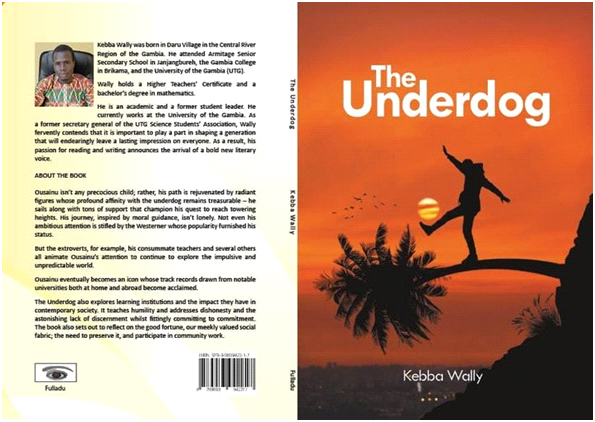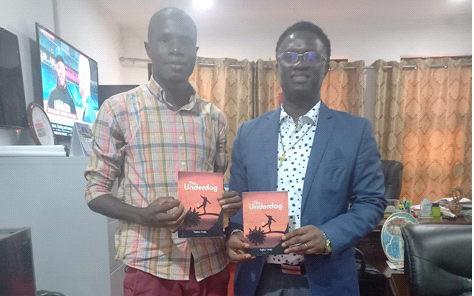By Momodou Jarju
Kebba Wally announced on his Facebook wall on January 3rd 2023, that “The Underdog” will be on sale for the first time on January 9th 2023. He was referring to his debut novel published by Fulladu Publishers and valued at D300.00.
Writing in an interview to this medium recently, the Gambian writer and teacher said “The Underdog” is a tale of an underdog who is committed to learning and maintaining excellence in school.
Cross-cutting issues such as corruption, modernisation, and participation in community works as well as some learning institutions in The Gambia and their roles towards national development were brought to light in the book.
Wally disclosed that his book has been the subject of extensive scholarly investigation.
“In other words, it is an epic tale of young people growing up in a world that is always changing,” he explained.
Wally said a lot of thoughts crossed his mind before he started to write the page-turned book. First, he didn’t want to bore or irritate his would-be readers but keep them led in incredible bliss, even though the writing was never easy.
“Second, my readership deserves my best work; they do not deserve my worst. Even though I enjoy math and have taught it, I gave this objective some thought because, in my opinion, reading motivates me to do more math. The Underdog so obtains all the calculus it needs,” he explained.
Writing Journey
Born in Daru Village in the Central River Region (CRR) on November 30, 1995, Kebba Wally is a graduate student of the Gambia College and the University of The Gambia (UTG).
Until his recent appointment at the UTG, Wally had been a high school mathematics teacher from 2017 to 2022.
Wally recalled his writing ride started in secondary school, precisely in 2014.
“While in secondary school, I wrote letters and stories on my initiative and would give them to my English teachers for evaluation. I have always been curious and this curiosity has challenged me to explore new initiatives,” he said.
While at UTG (2014-19), he continued with the craft and commenced sharing his write-ups on social media platforms. Serving as the secretary general of the 13th Executive Council of the Science Students’ Association at the UTG helped rekindle his writing taste.
The debut author noted that many people have the disposition that mathematics teachers don’t speak or write good English. But he doesn’t blame them, saying they don’t know the relationship that persists between the two areas.
“I have always believed that the English language is inextricably linked to mathematics. To just justify this is quite crystal: mathematics improves one’s thinking capabilities and this to a huge extent will make them more robust and thought-provoking in their search for an appealing piece of work. This disposition, be that as it may, has induced me to write meticulously well,” Wally said.
Meanwhile, Mr Wally thanked buyers of his book and particularly to the Minister of Higher Education Research Science and Technology, Professor Pierre Gomez who supported him financially, following the completion of the book.

Thoughts on Gambian Literature:
The Gambia’s publishing industry has been gaining momentum since the dawn of a new dispensation in 2017, with book publications taking place every month. Writer Wally is cognizant of this fact.
“Writing in The Gambia over the years has registered tremendously meaningful gains,” he said. “As writers, we want to contribute to making the world a better place for human existence. We authors want to do our part to improve the quality of life for everyone. Because authors are not flawless, working to broaden our knowledge base to improve ourselves and our writing prowess is a top priority for us,” he said.
Writing further, Wally said writing is more relevant today as it allows people to share stories or subjects with a wide audience.
He said: “Many people have ideas in a very special way, but only a few are privileged to share their own. As Chimamanda Ngozi Adichie would put it, “in reading we expose our bodies to live in a world that is not ours.”


















